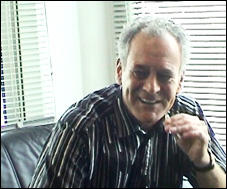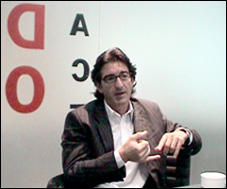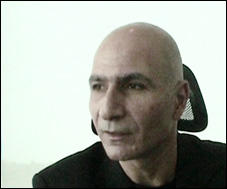 Next in a series of interviews I first met up with Ed Jones, Executive Creative Director of Saatchi & Saatchi Dubai, Middle East, (who has spent considerable amount of time working in London and now the Middle East). “Dubai has invented itself largely; it enjoys doing things in grandiosity, splendor, having the tallest building, the whackiest hotel and the weirdest offshore islands” he says. The underlying vision is to encourage people (significantly expats) to spend money within the country and at the same time bring in money from the outside, to encourage investment in Dubai. So whether it is shopping in the splendid malls, surfing on the dunes or just owning property in Dubai, Dubai has turned itself into a City Center where money is spent and things are bought. This in turn creates a very high demand for companies to turn to advertising and sell their ideas.
Next in a series of interviews I first met up with Ed Jones, Executive Creative Director of Saatchi & Saatchi Dubai, Middle East, (who has spent considerable amount of time working in London and now the Middle East). “Dubai has invented itself largely; it enjoys doing things in grandiosity, splendor, having the tallest building, the whackiest hotel and the weirdest offshore islands” he says. The underlying vision is to encourage people (significantly expats) to spend money within the country and at the same time bring in money from the outside, to encourage investment in Dubai. So whether it is shopping in the splendid malls, surfing on the dunes or just owning property in Dubai, Dubai has turned itself into a City Center where money is spent and things are bought. This in turn creates a very high demand for companies to turn to advertising and sell their ideas.Although, the UAE market is still untouched and pure in terms of ad pollution compared to the western metropolis like London and New York for example, but that is where the opportunity to do things differently, lies. With the consumers becoming conscious and sophisticated in their choices and with more exposure to digital technology, the need to find new ways to reach people and creative advertising is becoming evident in UAE. “As the market becomes less easily persuaded by the obvious and familiar methods then you have to be more innovative” says Ed Jones.
“People read or watch what interests them and sometimes it’s an ad” continued Ed Jones, and that’s how the viral advertising for instance works “that it’s not dumped on people involuntarily”, but it will only work if people enjoy the experience because then they will pass it on to friends, “Maybe it is a laugh, although, quite often the laugh will convey a commercial punch line” but that is good because humour is engaging. The BMW Campaign, Burger King’s Subservient Chicken and the Honda Grrrr ad are great examples of virals that people are choosing to watch. So according to Ed Jones, virals essentially have to be witty, simple, attractive and entertaining to watch.
 Douglas Palau, is the Vice President of Network Marketing at Impact BBDO, and also the Managing Director of Impact Proximity, Dubai BBDO Worldwide Network, (coming from an advertising background in London as well) sees “a competitive edge coming, with a high adoption of technology”. UAE ranks amongst the top ten countries in the world with the highest penetration of internet and mobile phones. “UAE and Saudi Arabia in particular, have embraced the digital technology because it offers an otherwise conservative and segregated culture, a freedom to interact on a one to one level ”, says Douglas Palau insightfully.
Douglas Palau, is the Vice President of Network Marketing at Impact BBDO, and also the Managing Director of Impact Proximity, Dubai BBDO Worldwide Network, (coming from an advertising background in London as well) sees “a competitive edge coming, with a high adoption of technology”. UAE ranks amongst the top ten countries in the world with the highest penetration of internet and mobile phones. “UAE and Saudi Arabia in particular, have embraced the digital technology because it offers an otherwise conservative and segregated culture, a freedom to interact on a one to one level ”, says Douglas Palau insightfully.So, in a way, the coming of internet to this part of the world is the coming of age, liberation, connectivity with speed for the Emaratis; breaking the barriers of cultural conformity (monitored by the government); and also because the cities are new and still developing, it easier to integrate the technology into the infrastructure.
Although, viral marketing, through the internet and MMS, is still an unexplored territory in the region and hasn’t yet saturated the market, which is why I think, done cleverly, viral marketing can be the new pink for the advertising world in the UAE.
Talking about the 360 degree branding at Proximity, Douglas Palau says that “Creating Interactive Brand Experience can offer their clients a medium to connect to the consumer on a personal level, it offers
a) Measurably
b) Cost effectiveness and
c) Speed
All of which are fantastic adjectives to describe marketing", he says . "We offer our clients a brand building tool to reach their consumers in a way that is relevant, engaging and what they want to hear or see" as opposed interruption marketing.
As responsible, ethical and self regulatory marketers “our role is to make sure that we have permission to pass on those messages in the first place”. Virals are not forced, they won’t work if it’s not voluntary “and at the end of the day, consumers have the power; now more than ever, we have to make sure that it works for them” he says, "because if it doesn’t they will use the same technology against the corporations, which is what the corporate blogs are doing these days. Companies that are in public relations know how to use that power". In a way it’s good to have that because it balances out the corporate-consumer ecosystem.
Towards the end of our conversation I threw in the inevitable generic question that I just had to ask. I asked him, what he thought would be a successful formula for spreading the idea virus? To which smiled and replied “There is no simple answer for that, the best way to build a successful Viral Marketing Model is to study past success and failures and learning through trial and error”, the more you do it the better you will be.
 With over seventeen years of advertising experience in the Gulf Region Kamal Dimachkie, the Managing Director of LEO Burnett Group, UAE; also realises the potential of a booming economy in UAE and especially in Dubai, which is what brings people to this land (apart from the fact that it is completely Tax free). Analysing the cultural dynamics for of UAE, he points out that “People here mainly interact through work because there isn’t a pure UAE dynamics that has been long established through a culture that is unique to that place, like other countries of the world. So, while you don’t have that - the culture revolves around work and public forms of entertainment. And Like any other community, word of mouth is the first indicator of a successful contagion. People very often underestimate the power of the word of mouth”.
With over seventeen years of advertising experience in the Gulf Region Kamal Dimachkie, the Managing Director of LEO Burnett Group, UAE; also realises the potential of a booming economy in UAE and especially in Dubai, which is what brings people to this land (apart from the fact that it is completely Tax free). Analysing the cultural dynamics for of UAE, he points out that “People here mainly interact through work because there isn’t a pure UAE dynamics that has been long established through a culture that is unique to that place, like other countries of the world. So, while you don’t have that - the culture revolves around work and public forms of entertainment. And Like any other community, word of mouth is the first indicator of a successful contagion. People very often underestimate the power of the word of mouth”.“Despite the growth of mass markets, it is giving rise to the concept of congregation which means that bigger groups form around singular communities, and within these passion groups, once a brand has hit a focal point and gets them talking about it, is when a brand has managed to create a buzz”. “And to do that”, he continues “you need to be relevant, innovative in the way you talk to people, because on an average, a person living in UAE is exposed to less than 4700 messages a day.
Hence, the importance for any new message to compete
a) has to have something interesting to say,
b) to be able to say it in a manner that attracts people and get them to stick and listen and
c) to reach at a place and time where they are willing to listen”.
And my last question to a man who seemed so obviously passionate about brand psychology was, “How do you create a buzz?” His answer was simple and intuitive “An interesting story, an experience that people can relate to, a situation and time where that story and experience can fill a gap in your life”.
Posted by Nadia Aamer


No comments:
Post a Comment